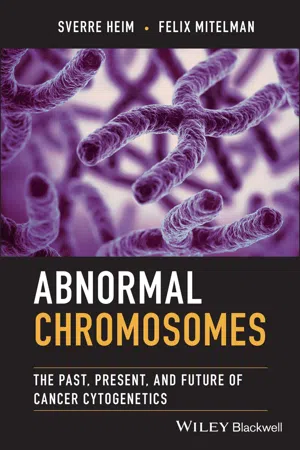
Abnormal Chromosomes
The Past, Present, and Future of Cancer Cytogenetics
- English
- ePUB (mobile friendly)
- Available on iOS & Android
About this book
Explore the past, present, and future of cancer cytogenetics In Abnormal Chromosomes: The Past, Present, and Future of Cancer Cytogenetics, globally renowned researchers Drs. Sverre Heim and Felix Mitelman deliver a state-of-the-art review of how cancer cytogenetic analyses have contributed to an improved understanding of tumorigenesis as well as to the diagnosis and treatment of cancer patients. The book also discusses how cytogenetics – the study of chromosomes - meets, interacts with, and cross-fertilizes other investigative technologies, including molecular somatic cell genetics. The book provides an impetus to think more deeply about the role chromosomes, and their abnormalities, play in health and disease, especially in neoplastic disorders. From which origins did cytogenetics develop? How did the finding of acquired chromosomal abnormalities in cells of leukemias and solid tumors influence our understanding of cancer as a biological process? How was information of this nature put to good use in the clinical management of cancer patients? Abnormal Chromosomes: The Past, Present, and Future of Cancer Cytogenetics offers readers:
- A thorough introduction to ancient theories of disease, the advent of cellular pathology, and how a scientific interest in chromosomes developed
- Comprehensive exploration of the conceptual importance of Theodor Boveri and his somatic mutation theory of cancer
- A detailed chronological resume of cancer cytogenetic discoveries during the 20th century
- In-depth discussions of the role of chromosome abnormalities, oncogenes, and tumor suppressor genes in leukemias, lymphomas, and solid tumors, together with a survey of what chromosome analyses have revealed about the clonal evolution of neoplastic cell populations
- A discussion of the importance of pathogenetic classifications of neoplastic diseases, the role chromosome abnormalities play in this context, and which technological breakthroughs can be expected in chromosome-oriented cancer research
Abnormal Chromosomes: The Past, Present, and Future of Cancer Cytogenetics was written for everyone with a scientific or clinical interest in cancer, especially how acquired chromosome abnormalities lead to neoplastic transformation. The book teaches how cytogenetic analyses contribute to a better understanding of tumorigenesis, but also how the finding of specific chromosome aberrations can be crucial for the diagnosis, prognosis, and management of cancer patients.
Frequently asked questions
- Essential is ideal for learners and professionals who enjoy exploring a wide range of subjects. Access the Essential Library with 800,000+ trusted titles and best-sellers across business, personal growth, and the humanities. Includes unlimited reading time and Standard Read Aloud voice.
- Complete: Perfect for advanced learners and researchers needing full, unrestricted access. Unlock 1.4M+ books across hundreds of subjects, including academic and specialized titles. The Complete Plan also includes advanced features like Premium Read Aloud and Research Assistant.
Please note we cannot support devices running on iOS 13 and Android 7 or earlier. Learn more about using the app.
Information
PART I
PAST
CHAPTER 1
Understanding Disease: Ancient Theories
FURTHER READING
- Lane Fox, R. (2020). The Invention of Medicine: From Homer to Hippocrates. London: Penguin.
- Porter, R. (2006). The Cambridge History of Medicine. Cambridge: Cambridge University Press.
- Wise Bauer, S. (2015). The Story of Western Science: From the Writings of Aristotle to the Big Bang Theory. New York: WW Norton.
CHAPTER 2
The Advent of Cellular Pathology
Table of contents
- Cover
- Table of Contents
- Title Page
- Copyright
- Preface
- PART I: PAST
- PART II: PRESENT
- PART III: FUTURE
- Afterthoughts
- Index
- Wiley End User License Agreement